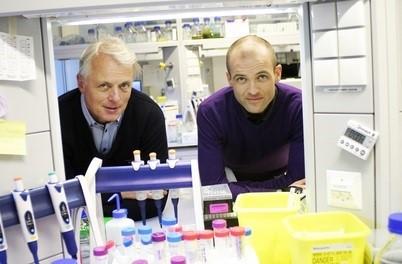Two New Grants from the Norwegian Research Council for the research groups at Mohn cancer laboratory
In December 2018, professor Per Eystein lønning and senior researcher Stian Knappskog each received a new research grant of 10 mill NOK from the Norwegian Research Council under the FRIMEDBIO program. Since only 5-10% of all applications to this program are funded, we are very happy that two groups within our research environment received such grants.
Hovedinnhold
“Prenatal BRCA1 methylation and breast and ovarian cancer risk”
The project, headed by professor Lønning, is a direct follow-up of a recent major publication by the group in Annals of Internal Medicine: http://annals.org/aim/fullarticle/2669848/white-blood-cell-brca1-promoter-methylation-status-ovarian-cancer-risk.
The previous work revealed methylation of the breast cancer type-1 gene (BRCA1) in blood cells of healthy individuals to be associated with an elevated risk of ovarian cancer.
In the new project funded by the Norwegian Research Council, we will further explore BRCA1 methylation as a risk factor for ovarian as well as breast cancer.
Further, as BRCA1 methylation seems to arise already before birth, we aim at exploring potential mechanisms behind such alterations, seeking ways of preventing it to occur.
We believe the findings from this NFR funded project will lead to a better understanding of methylation as a mechanism of cancer induction, so-far poorly understood with potential implications to cancer prevention in the future.
“Genetic alterations governing response to breast cancer therapy”
The project, headed by dr Stian Knappskog, is based on deep sequencing analyses of samples from clinical trials, aiming at identifying predictive biomarkers for efficacy of chemotherapy.
Previously, the team has conducted clinical trials where breast cancer patients have received monotherapy (one single chemotherapeutic drug) in the timespan between diagnosis and surgery.
In the new project, we will perform in depth genomic analyses of tumor samples before and after chemotherapy.
We will compare mutations and the mutational landscape both between patients with good vs. poor response to the same drug, and also between samples taken before and after chemotherapy, in the same patient.
We believe the findings form this project will identify new predictive biomarkers and potentially pave the way for more personalized breast cancer treatment in the future.


